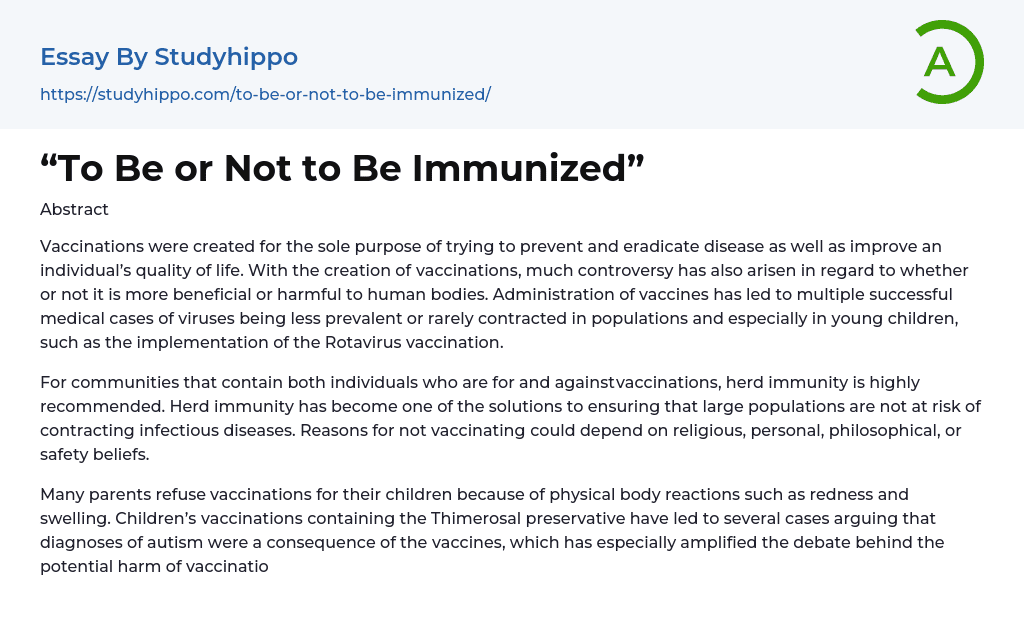Abstract
Vaccinations
were created with the purpose of preventing diseases and improving the quality of life for individuals. However, the development of
vaccines
has generated controversy regarding their advantages and potential harm to the human body. The utilization of
vaccines
has led to successful instances where viral infections have become less common or rarely contracted, especially among young children, such as the implementation of the Rotavirus
vaccination.
For communities that have both supporters and opponents of vaccinat
...ions, herd immunity is strongly recommended. Herd immunity serves as a solution to safeguard large populations against the risk of contracting infectious diseases. Reasons for choosing not to vaccinate may stem from religious, personal, philosophical, or safety beliefs. Several parents decline vaccinating their children due to physical reactions like redness and swelling.
The use of Thimerosal-containing vaccines in children has sparked a debate over the relation between vaccinations and autism diagnoses, which also raised concerns about potential adverse effects of vaccinations. Throughout history, humans have adopted different measures like quarantine to eliminate and prevent diseases. However, advancements in technology and modern medicine have brought significant changes in the medical field during the 20th century.
Thanks to the accessibility of vaccines, diseases once deemed fatal have been eradicated. Vaccines efficiently immunize and protect against infections, leading to the near extinction of illnesses like measles and polio. Throughout history, vaccines
have proven effective in saving numerous lives worldwide.
In medical history, vaccines have faced criticism leading some communities to reject them due to concerns about negative effects such as mumps, Rubella, and measles. Unfortunately, this resistance has impeded progress in modern medicine. Vaccines aim to enhance quality of life; however, an ongoing debate examines whether the benefits outweigh the rare potential side effects.
According to Scudder (2013), vaccines have significantly enhanced human life in various aspects. Vaccination is regarded as a significant societal progress since it has eliminated the threat of diseases like polio for present-day children. In 2000, measles was entirely eradicated in the United States (Berman, 2015) thanks to the effectiveness of measles vaccines provided by public health institutions.
Berman emphasizes that while diseases have been eliminated, there are still occasional occurrences of measles in the country. These instances typically arise when unvaccinated individuals contract the virus from either traveling to or hosting visitors from nations with high measles rates. It has been observed that communities become susceptible to infections and illnesses if a portion of the population refuses or neglects immunization. As stated by (John & Samuel, 2000), practicing herd immunity is essential for protecting communities and societies against ailments such as smallpox. Herd immunity involves vaccinating a significant portion or majority of the population against contagious diseases.
When the majority of individuals receive vaccination, they provide protection against diseases for those who have not been vaccinated. This means that people who decide not to be immunized and do not vaccinate their children are benefiting from the immunity given by others in their community. Therefore, it is crucial to ensure that every person is safeguarded against
diseases. As stated by Anderson (2015), immunization is the most beneficial public health measure of the 20th century. Vaccines, such as the Rotavirus vaccine, have had significant positive effects on infants and toddlers.
According to the CDC (2019), Rotavirus disease is a significant global health issue that results in severe diarrhea among infants and children. Sadly, this illness has caused the deaths of over 60 children in the United States. Nevertheless, vaccines have become crucial in fighting against severe Rotavirus diarrhea. The CDC states that administering the vaccine is highly successful in preventing diarrhea among vaccinated children. Despite the undeniable advancements and benefits brought by vaccines, criticism surrounding their use has persisted since their introduction.
There are various reasons why individuals, especially parents and their kids, choose not to receive vaccinations. These reasons may include religious, personal, philosophical beliefs, or concerns regarding safety. The fear of potential side effects from vaccines has sparked significant debates. A particular controversy (Miller, Tadrous & Hurley, 2010) examines the link between Thimerosal in vaccines and the prevalence of autism in children. According to the CDC (2019), Thimerosal has traditionally been used as a preservative in vaccines and vials containing multiple medications.
The adverse reactions caused by vaccines, such as redness and swelling on the injection sites, have led to parental hesitancy towards immunizing children. This has sparked a debate regarding potential health complications linked to vaccination. Nonetheless, technological and medical progress has prompted many to assert that vaccines not only safeguard populations but also assist in combating costly infectious diseases that diminish quality of life. On the other hand, certain individuals contend that vaccines could do more harm than good. In conclusion,
comprehensive research on vaccinations is imperative for addressing any controversies surrounding this issue.
References
- Anderson, V. (2015). Promoting Childhood Immunizations. The Journal For Nurse Practitioners, 11(1), 1-10. doi: 10.1016/j.nurpra.2014.10.016
- Berman, M. (2015). How the U.S. went from eliminating measles to a measles outbreak at Disneyland. Retrieved from https://www.washingtonpost.com/news/post-nation/wp/2015/01/23/how-the-u-s-went-from-eliminating-measles-to-a-measles-outbreak-at-disneyland/?noredirect=on&utm_term=.eb275f643db9
- CDC. (2019). Vaccine Information Statement | Rotavirus | VIS | CDC.
Retrieved from https://www.cdc.gov/vaccines/hcp/vis/vis-statements/rotavirus.html
John, R., & Samuel, T. (2000). Herd immunity and herd effect: new insights and definitions. - PubMed - NCBI. Retrieved from https://www.ncbi.nlm.nih.gov/pubmed/11078115
Miller, E., Tadrous, M., & Hurley, A. (2010).
Thimerosal-Containing Vaccines and Autism: A Review of Recent Epidemiologic Studies. Retrieved from https://www.ncbi.nlm.nih.gov/pmc/articles/PMC3018252/
- alternative medicine essays
- Aspirin essays
- Cannabis essays
- Cardiology essays
- Cloning essays
- Dentist essays
- drugs essays
- Hemoglobin essays
- Medical essays
- Medical Ethics essays
- Organ Donation essays
- Patient essays
- Pharmacology essays
- Plastic Surgery essays
- Surgery essays
- Therapy essays
- Vaccines essays




